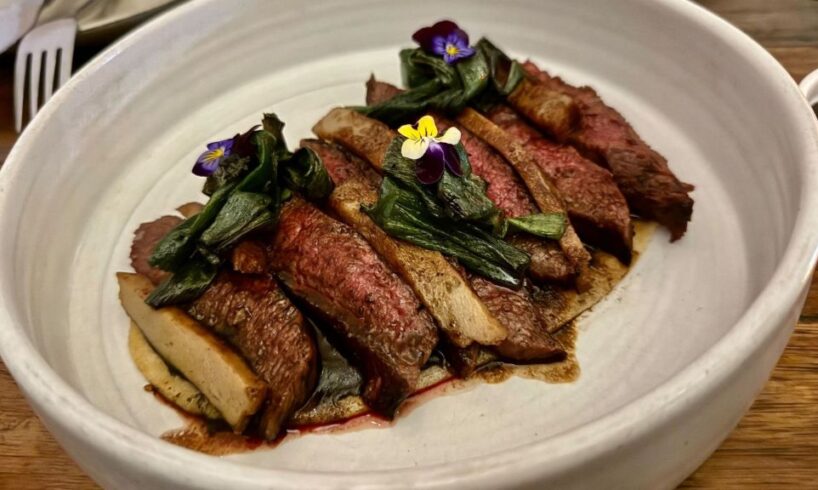
After years of testing and regulatory hurdles, Australian startup Vow has released its cultured (or ‘lab-grown’) Japanese quail in Australian restaurants. And I’ve finally had the chance to taste it.
As a technology journalist, home cook, and self-proclaimed foodie, I’ve kept a close eye on the alternative meat space for many years.
My past adventures have included sneaking into closed taste-tests of Impossible’s pork at CES and sampling plant-based chicken engineered by an ex-Boeing scientist in a backstreet Seattle lab.
So since Vow first announced its cultured Japanese quail product, known as ‘Forged’ in early 2024, I have been impatiently waiting to give it a try.
Related Article Block Placeholder
Article ID: 251901
Vow itself has had a notable trajectory. Launched in 2019 with a mission to create “foods never eaten before,” Vow has raised more than $80 million from investors including Blackbird Ventures and Square Peg. This included a $73 million raise back in 2022.
Smarter business news. Straight to your inbox.
For startup founders, small businesses and leaders. Build sharper instincts and better strategy by learning from Australia’s smartest business minds. Sign up for free.
By continuing, you agree to our Terms & Conditions and Privacy Policy.
Along the way, it built Australia’s largest cultivated meat facility and became the first company approved by Food Standards Australia New Zealand (FSANZ) for the commercial sale of cultivated meat.
Before appearing in Sydney restaurants, Forged (originally called ‘Morsel‘) had already debuted internationally at Singapore’s Mandala Club in late 2024, starring in a headline seven-course omakase. Vow’s profile also rose globally thanks to PR stunts like the “woolly mammoth meatball”.
All of this is to say that after years of anticipation, I was, frankly, starving.
Vow’s Forged Gras x Maiz: Innovation on a plate
The full description of Vow’s Forged x Maiz dish featuring cultured Japanese quail. Image: Tegan Jones
My experience with Vow’s cultured Japanese quail came in the form of ‘Forged Gras’ at Maiz, a standout among Sydney’s current wave of Mexican restaurants.
Located in the heart of Newtown, Maiz is known for reinventing authentic Mexican classics and flavours with a modern twist.
As the name suggests, Maiz is a love letter to corn itself, with the menu highlighting house-made moles, blue corn, and seasonal produce.
It’s one of the best eating experiences I’ve had in Sydney, even beyond the cultured dish.
For the Forged Gras, Maiz takes a holistic rather than purely plant-based approach. The dish is served as part of a $56 dish: a blue corn huarache provides the base, topped with flat iron steak, rich huitlacoche bearnaise (a sauce made from prized Mexican corn fungus), charred spring onion salsa, and a glossy barbacoa glaze.
When I asked, the chef told me he spent about a week designing the best dish to showcase the unique flavor profile of the cultured quail.
From the first bite, Forged Gras impressed. Despite looking like a slither of mushroom, the texture was exceptionally soft and spreadable. It was reminiscent of bone marrow but embodied deep umami and fungi-forward notes that paired perfectly with the steak and earthy sauce.
For me, it evoked the comforting indulgence of a Sunday roast, but with the bright, layered flavor profile of Mexican cuisine.
The decision to pair the cultured quail pâté with steak, rather than presenting it as a vegan alternative, makes the concept accessible for mainstream diners and presents the dish as a genuine collaboration, as well as an ethical substitute.
It also follows in the footsteps of Mandala in Singapore, which offered diners a savoury cannoli filled with ‘forged parfait’ and black pearl caviar, as well as a ‘Hokkaido Wagyu Sando’ – a milk bun topped with A5 Hokkaido wagyu and Forged Parfait.
I also appreciated the ingredient as an alternative to traditional foie gras, which even some meat eaters (including myself) still avoid for ethical reasons. Forged Gras offers the richness of classic foie gras, but without animal cruelty, making it a far more appealing option for anyone concerned about ethical eating.
It’s also worth noting Maiz isn’t the only venue in Sydney currently serving Forged’s cultured quail.
The launch has quickly extended to several leading Sydney restaurants, each putting its own spin on Vow’s flagship product. You’ll find it at Kitchen by Mike in the CBD, Nel in Surry Hills, and at The Waratah.
Australia’s regulatory future with cultured meat
Vow’s woolly mammoth meatball. Source: Vow
The journey toward regulatory approval for cultivated meat in Australia has been lengthy and detailed.
FSANZ’s June 2025 clearance for Vow’s cultured quail required years of scientific and food safety assessments, public consultations, and amendments to food codes.
Australia now stands alongside Singapore, the United States, and the Netherlands as one of the first countries in the world to approve this new category. Industry observers hope this opens the door to broader acceptance and investment in alternative proteins, with the regulatory template likely to be followed by future applicants.
What I’m hoping is that the Forged Gras and other products in the cultured meat category become more than a curiosity.
Related Article Block Placeholder
Article ID: 261312
My experience at Maiz confirmed that when technology meets thoughtful cooking, you get a dish worthy of hype and ready for serious diners.
However, as we have seen with most meat alternatives over the past 10 years, pricing still remains a barrier to adoption. Forged Gras is firmly in the high-end realm of the food scene, and that is reflected in the restaurant prices.
That’s to be expected given how new it is. But my hope is that in the future, cultured meat and meat alternatives in general will become more fiscally accessible for meat and non-meat eaters alike.
But for now, I am satiated with the idea that the arrival of cultured meat in the mainstream means that the conversation around food, innovation, and sustainability is going to get a lot more interesting.
Disclaimer: The author reviewed Forged Gras as a guest of Vow.





